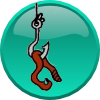Acts
Who, When, Where
Written by Loukas (Luke). Loukas was a Greek physician and historian. He researched and documented the life of Yeshua, and then joined in on the mission (in Acts 11).
The story starts with Yeshua’s ascension into heaven around 30AD. And it ends around 60AD with Paulus under house arrest in Rome, waiting to be heard by Caesar on the (false) charges brought against him in Jerusalem.
There are no dates provided as you go along, so remember that it covers 30 years. It didn’t all happen in a week.
Actually remember that too when you read of the Holy Spirit speaking to people in visions, dreams, and even voices. Its easy to think that that happened every day to people like Paulus and Petros. But they were special events, and only happened rarely over that 30 year period.
This story starts out in Jerusalem, but expands all across Asia Minor (modern Turkey) and reaches across to Macedonia (modern Greece). It ends with a hazardous journey by boat all the way to Rome.
Summary
So, kind of Luke 2. Luke left off with Yeshua’s ascension, and Acts picks up from there and tells the story of the first 30 years or so of the church. It is really the Acts of the Holy Spirit since it’s him doing all the work.
It’s a story of miracles and power. It’s a story of devotion and faith in the face of persecution and trials. And it’s a story of encouragement for any would be missionary.
Whether you’re a missionary where you live now, or go overseas to another culture, either way, you have been chosen by God to represent him to the world. You are his ambassador. You are representing heaven. Not the country you were born in, but the country you were born again in.
Before You Read
If I didn’t believe that you were from God, how could you convince me? What could God do through you that I just wouldn’t be able to argue with?
What is stopping God doing that through you now?
Nothing right?
What would you be prepared to endure if you knew that in the end you might save a whole nation? What if you could only save one person?
As you read, put yourself in the place of Paulus or Petros and think about how you would have reacted to the things which happened to him. These are amazing Christians, but it is far from impossible that you could receive a bigger reward than them when you get to heaven.
Do you want it?
Key Verses
Acts 1:8
But you’ll receive power when the holy spirit has come upon you, and you’ll be witnesses to me in both Jerusalem, and in all of Judea and Samaria, and to the limits of the earth.”
This wasn’t a command. It was a prophecy. It was a promise. You will be my witnesses. And they were. I’m not sure where the limits of the earth are… Do you think we’ve got there yet?
Do you think the job is done? Do you think it’s getting close? Who do you think will be the last person to become a Christian?
Acts 2:8
How does each of us hear them in our own language, in which we were born?
Tongues is other languages, not just babble.
Acts 2:42
And they were devoted to the teaching of the ambassadors, and the partnership, and the breaking of bread, and prayers.
When you read this it gives you a particular picture of Christian life in those days. Is that anything like your Christian life? Are you devoted to all those things?
Why not? Don’t you think you should be?
Devoted.
Acts 4:19
But Petros and Yohannes answered them, saying, “Whether it’s right in the sight of God to listen to you instead of God - you decide, for we’re not able to not speak about what we’ve seen and heard.”
What would you do? If someone threatened you with prison if you didn’t stop following Yeshua? Would you walk away? Or would you accept the price?
It’s a tough choice isn’t it. And hard to know in advance what you would do. Hopefully you like to think you would answer like Petros and Yohannes did.
But if you don’t. Be comforted by knowing that your salvation is secure because it is 100% dependant on what Yeshua did 2,000 years ago, and 0% dependant on what you do now.
Acts 4:36-37
And Yoses, who was usually called Barnabas by the ambassadors, (which is translated as Son of Aid), a Levite, and a Cyprian by birth, when he’d sold a field which belonged to him, brought the money and placed it at the feet of the ambassadors.
What was the first big thing you did for God?
Barnabas sold a field and gave all the money to the early church.
We read a lot more about him later in Acts. He became one of the major missionaries and an important contributor in so many ways to the growth of the early church.
Step one - do something. Then be available to God to do more.
Acts 5
Ananias and Sapphira die for lying to the holy spirit.
They gave away half a property. That is very generous.
Petros told them that giving away half was completely acceptable. Their problem was they wanted everyone to think they gave away the whole thing.
Yeshua taught that our giving should be in secret. How about you? Do you want people to know how generous you are?
Are you so filled with pride that you’re willing to lie about it?
I’m presuming you’re not that bad. But it’s a good reminder for us all isn’t it.
Acts 5:38-39
“And now I say to you, stay away from these people and leave them alone, because if this counsel or work is from people, then it’ll be demolished. But if it’s from God, then you won’t be able to demolish it, otherwise you might even be found to be fighting against God.”
Such wise advice. If it’s from people, it will fail. If it’s from God it will succeed even if you oppose it.
And worse, … you will be fighting against God.
Is there some ministry you don’t agree with? Let it go, and see whether it was from God or not by it’s success or failure.
Is someone opposing your ministry? Don’t worry, if it’s from God then you will succeed anyway. If it’s not, then you shouldn’t be doing it anyway.
Are you opposing anything?
Are you fighting against God?
Acts 6:4
And we’ll be devoted to prayer and to the service of the message.
Not that one role is better than another. The men chosen to serve food were very spiritual. But their role was different.
Church needs leaders who are devoted to prayer and to the study and teaching of the message of God. It also needs godly people who are devoted to the practical needs of the church.
They are both important. They are both necessary. Neither could do their job properly without the other.
Work out which one suits your gifts and talents, and desires, better and do that.
Acts 8:1
And on that day a great persecution came upon the assembly in Jerusalem. And they were all dispersed to the regions of Judea and Samaria,
In Acts 1:8 Yeshua told them that they would be his witnesses in Jerusalem, and Judea, and Samaria, and the ends of the earth.
A few years later, in Acts 8, they were still just in Jerusalem. They hadn’t gone anywhere. So a persecution broke out which made them spread out to those places.
God did that before in the Old Testament too. He told us to spread out over the whole planet. We stayed where we were and built a great city (Babel). So he confused our language and made us spread out.
If it’s from men it will fail. If it’s from God it cannot be stopped.
Acts 11:7-8
And I heard a voice say to me, ‘Get up Petros. Kill and eat.’ But I said, ‘Far be it from me lord. Because nothing common or unclean has ever entered into my mouth.’
Good old Petros. He recognises that this voice is the lord. And says “No”… If God speaks directly to you in a voice from the sky… do what he says :)
The other thing here, is Petros uses the word “common”. In the Bible, in the Old Testament and the New, everything is divided into two types of things, “holy” and “common”. Some old translations say “profane” for common. Some just say “unholy” which is not the meaning of the original words, but it does highlight the division. Holy just means that something has been dedicated to God for his exclusive use. If you are a Christian then you are holy. This has nothing to do with your behaviour. Being holy and being righteous are two very different things. You have been reserved for God’s exclusive use.
This will require some changed thinking on your part. Can you imagine how upset God would be if you took something which had been set aside for his use, and you used it for serving the world?
Acts 11:26
The disciples first took the name Christian in Antioch.
Christ is a transliteration of the Greek word christos which means “anointed” or… “the anointed one”. So Christian just means Little Christs, “Little Anointeds”
The Greek word Christos is the equivalent of the Hebrew word Messiah, which also means “anointed”.
We see this a lot in the New Testament, and sadly the meanings are usually lost because the translators didn’t translate them but only transliterated them (made up English words with a similar sound to the Greek or Hebrew name).
Acts 11:28
Agabus got up and signalled through the spirit that a great famine was about to come on the whole of the inhabited world.
And it did. Prophecy is a real thing for Christians. The holy spirit talks directly with us and he does reveal things when we need to know them.
This is not something just for the Bible. Prophecy, and the other gifts of the holy spirit are for Christians now just as much as they were then.
Listen to prophecy. Listen to the holy spirit.
Acts 12:15
But they said to her, “You’re mad!” But she insisted strongly that it was so, so they said, “It’s his messenger.”
So after years of praying for miracles and seeing them come to be. Petros is arrested, so they gather everyone together to pray.
Then, when Petros knocks on their door they don’t believe it is possible, so they look for other explanations.
When you pray, do you believe it will happen?
Believe it! God can do way more than you can even imagine asking him. You have the righteousness of Yeshua attributed to you. God sees you as completely righteous and you have every authority to ask.
Ask.
Expect.
Acts 17:11
And these [Bereans] were more noble than those in Thessalonica - they welcomed the message with all eagerness, and they examined the writings each day to see if they said the same things.
Do you know what the Bible says? If someone said, “The Bible says such and such” would you know if they were right?
Don’t you think you should?
The Bereans didn’t just take Paulus’ word for things, they checked to see if he was telling the truth.
He was. The writings, (what we call the Old Testament), are actually about Yeshua.
Acts 17:23
For as I passed through and looked closely at your objects of worship I even found a pedestal on which had been inscribed, ‘To an unknown god’. This one of whom you’re not aware, but to whom you’re devout, this is the one I’m declaring to you.
We see this over and over in the New Testament. When people, including Yeshua, were talking to people who didn’t know the message of God, they didn’t start with a well rehearsed, same presentation fits everyone, speech.
Instead they started from where the people were at in their spiritual journey and led them towards the kingdom of God.
Successful missionaries have been doing this ever since. They get to know the culture of the people and they present the gospel in a culturally relevant way. Read up on Hudson Taylor, or read Peace Child by Don Richardson for some really good examples.
How about you? Do you adjust how you want to say things based on who you’re talking with?
Acts 20:35
… recalling the message of the lord Yeshua, that he himself said, “It’s more blessed to give than to receive.”
Do you think so?
Do you give more than you receive?
Perhaps you want to, but your current circumstances have you receiving more than you can give. Some times in life are like that. In those times, if people give to you, then accept it and let them have the blessing. Later in your life you may be in a position to bless others, but for now, let it be so.
Acts 21:29
For they had seen Trophimus, the Ephesian, with him in the city, and they supposed that Paul had brought him into the temple.
There are quite a few places in the Bible where it says that people made assumptions. In all of them it turned out that they were wrong.
How about you? Do you often get caught up in that trap? It is always good advice to “stick to the facts”. Don’t get caught up with what you assume people were thinking, or what their motives were, or what they meant by what they said. Stick to the facts. What did they say? What do you know for sure that they did? And if you want to start assuming… can you think of any possible good explanation for what they did? Do you have any reason at all to think that is not the correct explanation?
We always assume bad things about people. We need to train ourselves not to do that.
After You Read
What verses really stood out to you?
How would you summarize this book in a sentence or two? What is it about? What is God trying to say to us?
Is that how you want to live? Is that the adventure you want to have in your Christian life?
Or do you just want the T-shirt?
Christianity is a massive opportunity for adventure. It’s a chance to change the world, or at least your little part of it. It’s a chance to do something amazing with your life.
Escape the boredom, escape the mediocre, escape the slow relentless drain that sucks the life out of you one day at a time.
Live on the edge, and do something significant with your life.
Seriously, what have you got to lose? There is only one thing stopping you being a Paulos or a Petros. You.












